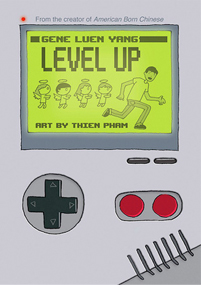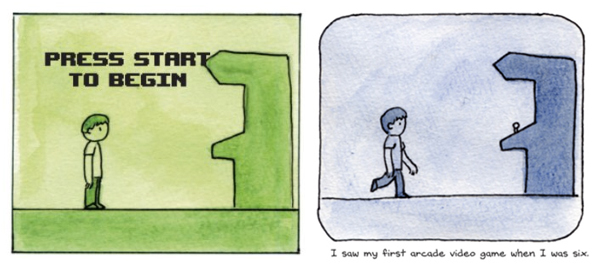 Level Up marks the return of award winning comic book artist Gene Luen Yang and this time, he’s collaborated with friend and fellow artist Thien Pham on a new graphic novel about bridging the generation gap between Asian American families and the pressures our parents instilled on our childhood. While Yang’s American Born Chinese, nominated for a National Book Award, followed three parallel tales about Asian American culture, Level Up addresses a topic geared more towards young adults–and one that many of us have faced with conflicting emotions.
Level Up marks the return of award winning comic book artist Gene Luen Yang and this time, he’s collaborated with friend and fellow artist Thien Pham on a new graphic novel about bridging the generation gap between Asian American families and the pressures our parents instilled on our childhood. While Yang’s American Born Chinese, nominated for a National Book Award, followed three parallel tales about Asian American culture, Level Up addresses a topic geared more towards young adults–and one that many of us have faced with conflicting emotions.
Dennis Ouyang is like any other Asian American boy; he loves video games with a passion but his strict father pushes him to study hard and attend medical school instead. Told through the lens of video games, Dennis must decide between pursuing his dreams and making his hard working parents happy.
With Pham’s warm drawing style and Yang’s great sense of humor, Level Up is a touching and relatable adventure about growing up Asian American, offering a tale of love, family and compromise. 8Asians spoke with Gene and Thien for more details about their new indie book, how the story came together (or almost didn’t) and their take on the perils and benefits of Asian parenting.
Can you tell us about the inspiration behind Level Up?
GY: Level Up is about a video game addict who is visited by angels one night and told that he has to go to medical school to fulfill his destiny. It’s inspired by my younger brother. My brother is a doctor (he’s the good Asian son) and when he was going through med school, he would come back and tell me the craziest stories.
He told me about labeling hemisected human heads, about doing experiments on his own fecal matter, about treating patients with strange fungal infections. It was all sooo gross, and sooo entertaining, I knew I had to put it all into a graphic novel of some kind. The problem was, my brother’s stories were just a collection of interesting incidents. There wasn’t a “center” that connected it all together, that gave it all a dramatic arc.
Finally, he called me up one day and said to me, “I’m thinking about specializing in gastroenterology.” That’s the study of the digestive tract. In other words, the study of poop. Now, this surprised me because my brother is an incredibly squeamish guy. When we were little, he gave away toys because their color reminded him of vomit.
When I asked him why somebody with as weak a stomach as his would consider gastroenterology, he said, “I did a colonoscopy the other day and it was like playing video games up somebody’s–”
Before he even finished, I knew I’d found my center.
Thien, could you relate to Dennis Ouyang’s tale in any way?
TP: Yeah, I think almost anyone can relate to this story. When we were doing this story Gene wanted me to draw a certain way, more precise and clean like [how] he and his previous collaborator Derek draw, but I wanted to follow my own heart, and do it in my own style. Gene did not agree, we fought a lot, but in the end I got to do it my way, and i think he will agree that its better this way.
GY: I have to say, the graphic novel turned out all right. Thien was right about the art. He’s not right about much, but he was right about the art.
How did you both come together for this book?
GY: Thien and I met through the Bay Area comics scene. Now, we also teach at the same high school. I teach Computer Science and he teaches art. One day, he showed me a couple of his comics pages and I thought to myself, “Hm. He’s better than I remember him being.” I asked him if he wanted to work on a project together. He agreed and we got going on Level Up.
It took us years to finish, though. There’s a character in the book that’s inspired by one of our students. He was a freshman when we started the book. Now he’s finishing up his second year of college.
TP: While all of Gene’s books were pretty awesome, I think Gene really wanted the art to look good on this one so he asked me to draw it.
 What was the drawing/writing process of Level Up? Was the script written first and then drawn or was it a back and forth collaboration?
What was the drawing/writing process of Level Up? Was the script written first and then drawn or was it a back and forth collaboration?
GY: I started by writing a script and doing thumbnails — quick little sketches of each panel. Then I handed the script and thumbnails off to Thien, who did the final art. Theoretically, he’s supposed to read through the entire script, do some character designs, and then start penciling, but he doesn’t always work that way…
TP: We both work really differently, and I think it was both good and bad. It was bad because Yang yelled at me all the time, but it was good because the amalgam of our two styles made for a very cool interesting book. That is Gene’s, mine, but also neither of our styles.
The “model minority” stereotype about Asian Americans has gotten a lot of attention this year, thanks to Tiger Mom Amy Chua and Wesley Yang’s Paper Tigers article. Your book deals with a similar premise: a young man coping with his father’s expectations with his passion for gaming. Why do you think this parent-child theme resonates so much with the Asian American community?
GY: A large population of Asian American immigrant’s kids are now coming into adulthood. We’re having kids, getting jobs, and finding our place in America. We have decide how much we agree with our parents’ ways of doing things — after all, so much of how we understand the “Asian” part of our Asian American identity is filtered through our parents.
Historically, Asian cultures were not hardcore about violin and spelling bees, but we associate those sorts of things with our heritage — for good or for ill — because many of our parents were hardcore about those sorts of things. It’s a strange thing, right?
We’re figuring out how to be Americans while at least respecting this “echo” of Asian culture that we experienced through our parents. I think this parent-child theme resonates with us because it describes our struggle to understand ourselves.
I really enjoyed the video games vs. med school battle and how Dennis experiences both worlds. What do you want your fans to take away from this experience? Do you think we should allow ourselves to both pursue what we love to do and what our parents want us to do?
GY: Well, that’s the thing, right? American culture tells us to follow our hearts. Asian culture — or at least Asian culture as filtered through our parents — tells us to pursue a more practical route. When I was young, all I wanted to do was follow my heart. All I wanted to do was draw cartoons, money and health insurance be damned.
But now that I’m older, I see the wisdom behind my parents’ thinking. Money and health insurance are important things. Even as a cartoonist, I can see how practical matters can affect my cartoons. If you’re relying on your art for food, your art often has to express someone else’s vision.
And, now that I’m older, I can see that following your heart doesn’t always lead to happiness. Not that I regret not becoming a dentist. I just think there’s a middle way between following our hearts and listening to our parents’ advice. You can let both inform your decisions.
Favorite video game of all time?
GY: MarioKart! Before it went all 3D. 3D games make me nauseous.
TP: Super Dodge Ball!!!
3D makes me nauseous, too, so I guess this means we won’t see Gene and Thien’s next collaboration in 3D–which is a good thing. Level Up hits store shelves on June 7th. Support APA artists and the indie comic book scene by picking up a copy!







